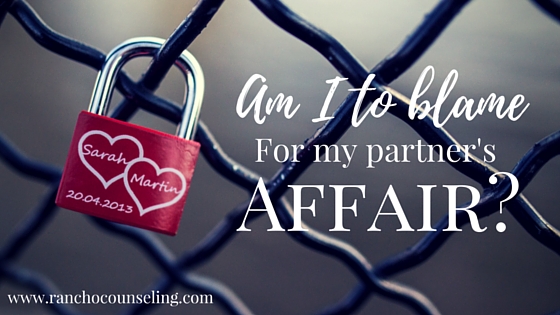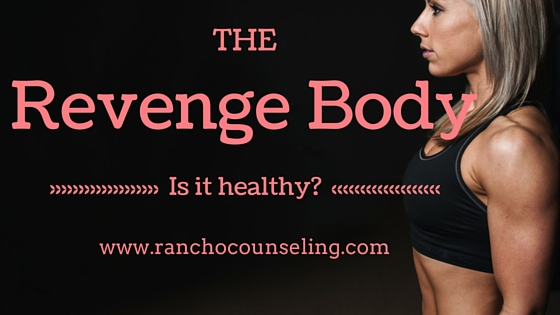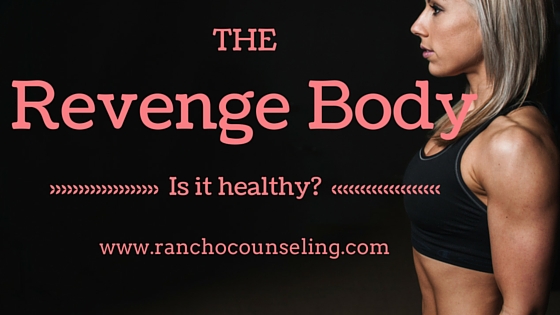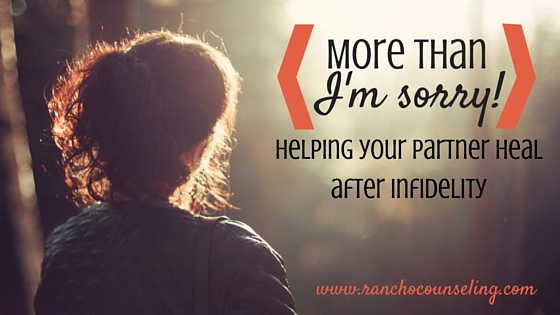
Blog
Am I to blame for my partner’s Affair?
When you discover that your partner has had an affair, it’s common to press rewind on the last year of your life together and look for all the signs you should have seen and things you missed. The times they were out late and didn’t invite you, the times they were on the phone way too long with their work colleague and you gave them the benefit of the doubt, not wanting to rock the boat.
Hindsight is always 20/20. Always. It’s just too easy to look back on an event and not see the signs, find the flubs, and scrutinize the details that were missed.
When you discover that your partner has had an affair, it’s common to press rewind on the last year of your life together and look for all the signs you should have seen and things you missed. The times they were out late and didn’t invite you, the times they were on the phone way too long with their work colleague and you gave them the benefit of the doubt, not wanting to rock the boat.
When hindsight is 20/20, it’s easy to place blame on yourself for missing the signs, or not acknowledging them or acting on your gut feeling in the moment. But the truth is, relationships are generally built on trust and it isn’t foolish to trust someone you love and are committed to.
As much as you’d probably like it to, the past can’t be erased, and the future of your relationship is what matters.
Many times I have clients who say things like, “I guess the last year was just one big lie. When we took that romantic vacation, and he said all those wonderful things to me, it must’ve been a lie!”
I beg to differ. Your partner saying they love you, and having an affair are not dependent upon one another. People can compartmentalize things in such a way that makes this possible. While I acknowledge that it’s confusing, I don’t believe that what is said in a moment of romance between you and your partner isn’t true for them. Just as what’s happening for them in the moments they share with someone they are having an affair with are also very real.
What you do in the aftermath of an affair is what matters most. How you handle and set new boundaries for your partner moving forward is where you can take charge, and ask for what you need.
I have seen clients that feel as though it is now their duty to punish their partner at all costs after discovering their affair. They tell their kids, they tell their friends, their family, and anyone else who will listen in an attempt to get their partner to feel shame for their transgressions.
When this happens, it creates a space that is no longer safe. Trust is one of the most difficult things to rebuild after infidelity, but when the injured partner creates a space of punishment at every corner, things can truly backfire and this often sends the straying partner back into the arms of the other.
So while you are not to blame for your partner straying in the first place, it is your responsibility to create a space and relationship after the affair where communication is open, and you are both able to be authentic as you push towards creating a new normal.
Looking back on the signs that you missed won’t do a lot of good. What will be beneficial is to identify your responsibility and contributions towards the rocky patch in your relationship that lead to your partner’s affair.
Did you stop communicating? Did you put your job ahead of your relationship? Did you stop nurturing the friendship between you and your partner? Once you can identify your role, you will have a good place to start the healing process.
You can only control yourself, and you can only work on changing yourself in the aftermath of an affair. You can change how you relate to your partner, how you communicate with them, and how you show up in your relationship, but without looking at yourself and really taking an inventory of what you need to change, there is no starting point.
Starting over can be a challenge, whether you’re starting over after an affair, or starting over completely, I’d like to help with the launch of my new e-course, The Starting Over Series. To get on the interest list and to receive more details about this at-home course that will be launching in the very near future, click here.
The Revenge Body: Is it healthy?
The “Revenge Body” is apparently a thing now that Khloe Kardashian has coined it and turned it into a new reality show. It’s quickly becoming a hot topic among those healing after heartbreak, but is it really that healthy?
The “Revenge Body” is apparently a thing now that Khloe Kardashian has coined it and turned it into a new reality show. It’s quickly becoming a hot topic among those healing after heartbreak, but is it really that healthy?
Exercise in and of itself is great, we all know that we should be getting at least 30 minutes every day, and that we should accompany it with a healthy diet and good sleep. If you’re suffering after a break up though, those things can be difficult to come by. You might find yourself lacking in the sleep department, eating as a means of comfort, and lacking the motivation to get you out of bed and into the gym.
Once you do pick yourself up and begin to heal a bit, hitting the gym and getting your sweat on can make you feel amazing. It creates those wonderful endorphins that send the “happy” signals to our brains, and the strength gained over time can be wonderfully empowering, but just like anything, it has to be done in moderation.
If you’re hitting the treadmill to blow off steam, create a sense of empowerment, and channel anger over the loss of a relationship, it can be easy to become addicted. The concept of the revenge body goes a little deeper than this though – with technology it isn’t just about improving confidence and weight loss, it’s more about flaunting bods in front of exes in hopes of feeling revenge – and that’s where it becomes a problem.
Over-obsession about body image and the premise that this revenge body is being created with the intention of brandishing it for an ex to ooogle over can set you up for some major disappointment.
If exercise has become an outlet for you, so be it. I’ve seen many clients run their first half-marathons, lose a healthy amount of weight, and reinvent themselves after a break-up, but when it borders on obsession and becomes over-consuming it’s no longer healthy.
Pushing yourself hard in the weight room and fantasizing over your ex’s reaction to your scantily clad Instagram post might fuel your workout, but that mentality quickly fizzles. Unless you are working hard for your own intrinsic motivation, it’s not likely to last, and you won’t necessarily keep it up over the long term.
Uncovering the need for revenge can be even more beneficial in the long run. I always tell my clients, “You can leave your relationship, but you have to take yourself with you.” Many times people think that they can move on with someone else and not have the same issues that caused their last relationship to crumble, but that’s not typically the case.
You can only control yourself, and learning more about who you are, what you want out of life and your relationships, and your contribution to the end of your relationship will give you far more rewards as you move forward than any revenge bod picture ever will.
Hit the gym, take a yoga class, go on a hike, whatever you do, do it because it feels good to you, and nothing else.
If you’re struggling to heal after heartbreak, and would like to learn more about healing in the most positive way, be sure to get on my interest list for The Starting over Series, an e-course I’m developing to help women everywhere heal from heartbreak and become the best version of themselves, so click to sign up below.
More than I'm sorry: Helping your partner heal after infidelity
One of my favorite clinicians in the field of psychology and couples therapy is Esther Perel, and she talks about a very important concept in overcoming infidelity, and it is that if you have been unfaithful to your partner but would like to do the work to keep the relationship together and work to repair things you must hold vigil for your relationship. What does this mean?
Infidelity can rock your relationship to the core. It brings out so many things and what’s amazing is that some of those things have the ability to make it stronger. After infidelity, many couples who decide to stay together find themselves talking more, sharing their needs more, and making their feelings and emotions known like never before.
As I’ve talked about before, when there has been infidelity and it’s been decided by the couple that they want to start the healing process, each partner needs to play a role in this. It isn't just the partner who has strayed's responsibility to repair the relationship but he or she does play a major role.
One of my favorite clinicians in the field of psychology and couples therapy is Esther Perel, and she talks about a very important concept in overcoming infidelity, and it is that if you have been unfaithful to your partner but would like to do the work to keep the relationship together, you must hold vigil for your relationship. What does this mean?
Holding vigil means that it is now your responsibility to not only acknowledge the hurt and pain that's been caused by your actions, but also acknowledge triggers for your partner before they happen. Through the healing process and especially if you've been working with a therapist to help get through this difficult time in your relationship, you'll come to understand places and things that trigger your partner to recall your affair.
Triggers are powerful and have the ability to bring an injured partner to their knees, causing them to revert back to square one, and cause all the pain of discovering the affair to come rushing back to them. Triggers can be so many things that just remind an injured partner of the event and of the pain they've felt since.
Holding vigil means that you take the time to bring those triggers up in anticipation of them happening, when it is appropriate. For example, if you know that your partner will be triggered by a certain event like being in a specific place because you had an encounter with the other person there, rather than just preparing yourself for the repercussions of their emotions you need to take action.
If you know that your partner is triggered by you going out of town for work because an affair occurred when you were traveling, as a work trip approaches it is then your responsibility to bring up the trip and acknowledge that you understand how this trip will make your partner feel. Be the one to broach the subject, be the one to reflect the hurt feelings, and be the one to say that you are there to hear about those feelings, and be the one to implement important changes during this trip to create a sense of security for your partner. Will you check in more frequently by phone, Skype, or text? Will you be sharing a room with a work colleague? Will you avoid the bar and drinks after dinner? What will you do instead?
Taking the time and energy to acknowledge your partner’s triggers and emotions, and creating a plan for security will help immensely in the healing process. This isn’t about beating yourself up, or being an emotional punching bag, but it is about taking an extra step to show your partner that you understand their feelings, and that you are there with them working through these difficulties with them.
I’ve had clients who have been injured by an affair tell me how elated they are when their partners do this. They describe it as a feeling of being understood, of being appreciated, and they say it is a relief because they were not the ones who had to bring it up.
They often feel relieved at not having to always ruin a perfectly nice evening with their partner by dredging up their emotions about an upcoming event that may trigger them. They feel understood when their partners acknowledge that a song or a movie makes them feel a flood of negative emotions even before they get that look on their faces. That acknowledgement is powerful and leads to connection and healing.
If you are having trouble holding vigil in your relationship after an affair, consulting a therapist can be an excellent path towards healing. I’d love to hear from you and point you in the right direction, and you may reach me at (909) 226-6124 for a free consultation.
Once a cheater, always a cheater?
Once a cheater, always a cheater. At least that’s how the saying goes, right? In my line of work I’m often the one doing the questioning, but I also get lots of questions from clients and professionals and one that comes up a great deal is, is this saying true?
Once a cheater, always a cheater. At least that’s how the saying goes, right? In my line of work I’m often the one doing the questioning, but I also get lots of questions from clients and professionals and one that comes up a great deal is, is this saying true?
My short answer is no, but then of course I have a lengthier version, which I will share with you today, and that is - it really depends. It depends on the reasoning behind the infidelity that will determine if the person will cheat again.
If someone is cheating because they are addicted to the excitement of being caught, or they are addicted to the spark of new romance, they may continually seek out affairs to find that spark, and to put themselves in a place of secrecy. While I’ve said that most people cheat in order to feel alive, and to rekindle life within themselves that they’ve lost in their relationship, I think this is different than what I previously described.
Although most people cheat to feel excitement, being addicted to that excitement is very different than seeking outside of your relationship to find something you’ve lost that you likely once had.
When people take the time to understand themselves and put in the work necessary to understand what lead them to stray outside of their relationship, it’s not likely that they will do it again. But the key is really that they’ve done the work. They’ve shown up, they’ve looked at themselves, they’ve looked at their relationship, and they’ve found understanding and insight into their motives for straying. And that of course is as intensive as it sounds. It takes work.
While the infidelity may have caused their relationship to end, someone who cheats still has to take themselves with them into their next relationship, and unless they’ve taken a good hard look at themselves, they are likely to continue in a similar fashion.
There’s often a misconception that if the relationship ends after infidelity, that’s the end of it. The person just wasn’t happy, they looked outside of their relationship to have something fulfilled, and it ultimately ended up killing their relationship, and they must then move on.
Many times infidelity can be the best thing that happens to a relationship. While I’d never wish it on anyone, nor is it something I suggest you do, it gets couples talking in a way they haven’t in many years, if ever. It serves as a wake-up call, and marks the start of a new, different relationship with the same partner. It definitely takes couples a long time to get to the point of seeing this, but it happens, and the new relationship that couples create following infidelity is one that is often more fulfilling, more intimate, and connected.
You can never “cheat-proof” any relationship, but it’s much less likely to happen again if both partners are truly invested in finding understanding for themselves and one another, and have a commitment to do things differently as they move forward. Once a cheater, not always a cheater is what I say, but that’s because I’ve been across the couch, asking the tough questions, and helping my clients find understanding.
If you could use some help sorting things out after infidelity, and could use a nonjudgmental third party, I’d love to help. Feel free to contact me at (909) 226-6124, and we can talk about ways therapy can help you understand yourself and your relationship. If your partner has recently been unfaithful, and you're struggling to figure out what to do next, click here to download my free guide on communicating after infidelity.
The #1 way to find healing after Heartbreak
Let’s just be honest, the healing process after the loss of a relationship really sucks. Even if you haven’t lost your relationship, and are just in the midst of a rocky road with your partner, there is one thing that you can do to help yourself heal, and it can’t be found in the arms of another, or at the bottom of a beer bottle. Although those things might sound appealing while you’re hurting, they tend to cause more harm than good.
Let’s just be frank, the healing process after the loss of a relationship really sucks. Even if you haven’t lost your relationship, and are just in the midst of a rocky road with your partner, there is one thing that you can do to help yourself heal, and it can’t be found in the arms of another, or at the bottom of a beer bottle. Although those things might sound appealing while you’re hurting, they tend to cause more harm than good.
The best thing that women can do for themselves in order to heal is to reconnect with their strengths. What I mean by that is, many times in relationships there are parts of us that become lost, or overshadowed, but those parts are important, and they make us who we are. They contributed to who we were before we entered into the relationship, and yet those parts often get neglected.
In order to reconnect with those strengths, reflection and introspection have to be involved. I’m a huge proponent of journaling, I recommend it to almost all of my clients who are struggling through life’s challenges. So women who are trying to heal can start journaling and thinking about the parts of themselves that they’ve neglected that once brought them a sense of happiness and strength.
Were you once an athlete, or involved in some sport that you no longer do? Is there a creative side to you that you don’t feed because you’ve become too busy? Are you great with money? Are you a great parent? Are you a great friend?
I help my clients look at those strengths and get back to them so they can start to feel like themselves again, but also more importantly so that they can begin to realize that although this relationship that they’ve lost or that is in a very rocky state – while it’s extremely important to them, it isn’t all that makes up their life.
Sometimes women can place far too much emphasis on their romantic relationship and allow it to govern all other aspects of their life rather than having a full life and allowing a relationship to fit in the picture as well.
A lot of the work that I do with the women in my therapy practice is helping them to find their strengths, and accentuating them, or building new strengths.
Another important piece in the healing process is making peace with what’s occurred by taking some responsibility for the contribution to the relationship issues, the infidelity, and the end of the relationship; owning up to your own shortcomings as a partner. It doesn’t always mean forgiveness, but it means coming to an understanding about what transpired, and moving forward after accepting that.
Do you know what your strengths are? If not, it might be time to reflect on them. Ask your close friends and family what they see as your strengths, or even what they saw that used to be your strengths, because maybe they’ve noticed you’ve lost them along the way as well. It can be difficult put yourself out there in such a way, but a close confidant will likely be truthful if you approach them in the right way.
Find your strengths, reconnect with the old ones, feed them, and you will find healing. If you could use some help finding the person you may have lost while caught in a tumultuous relationship, I’d love to help. You can contact me at (909) 226-6124 and I’ll be happy to discuss ways we can work together to help you reconnect with your amazing strengths.











